外研版(2019)必修第二册Unit 4 Stage and screen Using language课件(共64张PPT)
文档属性
| 名称 | 外研版(2019)必修第二册Unit 4 Stage and screen Using language课件(共64张PPT) |  | |
| 格式 | zip | ||
| 文件大小 | 3.3MB | ||
| 资源类型 | 教案 | ||
| 版本资源 | 外研版(2019) | ||
| 科目 | 英语 | ||
| 更新时间 | 2022-07-11 15:50:00 | ||
图片预览

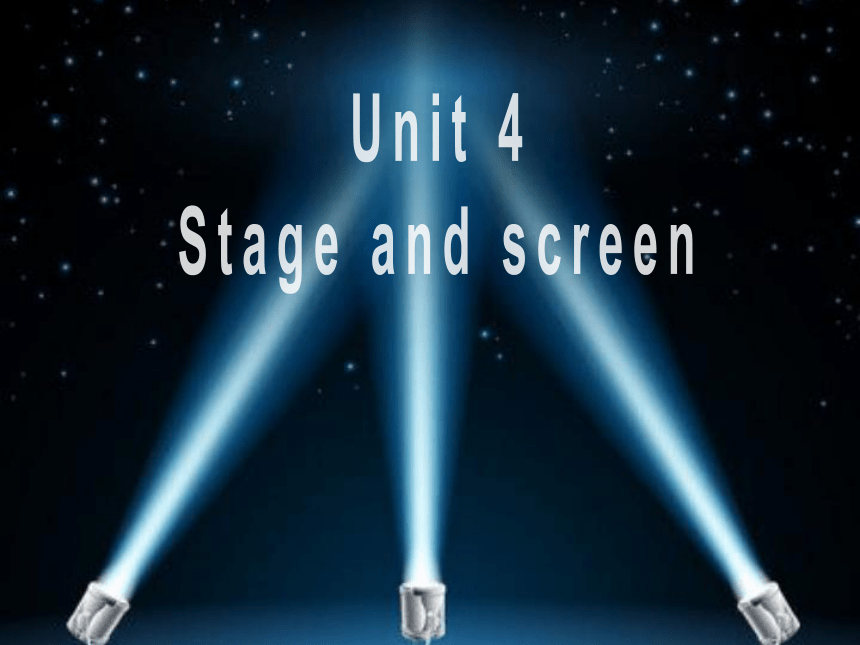
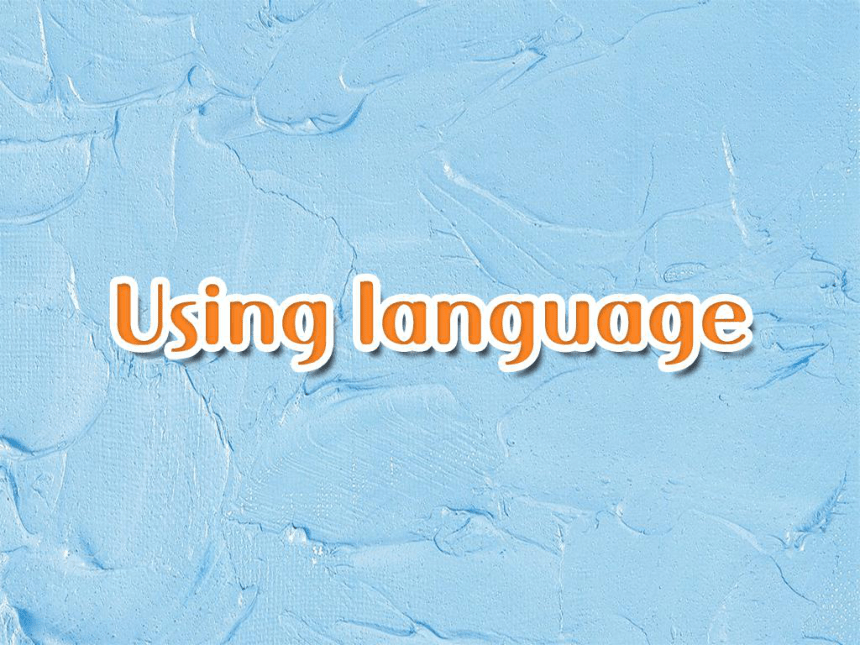
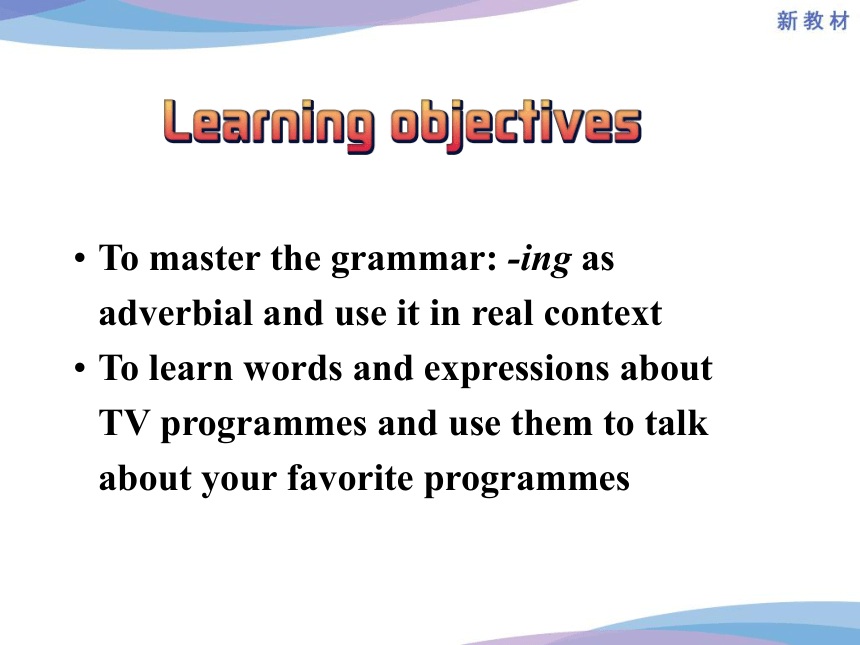
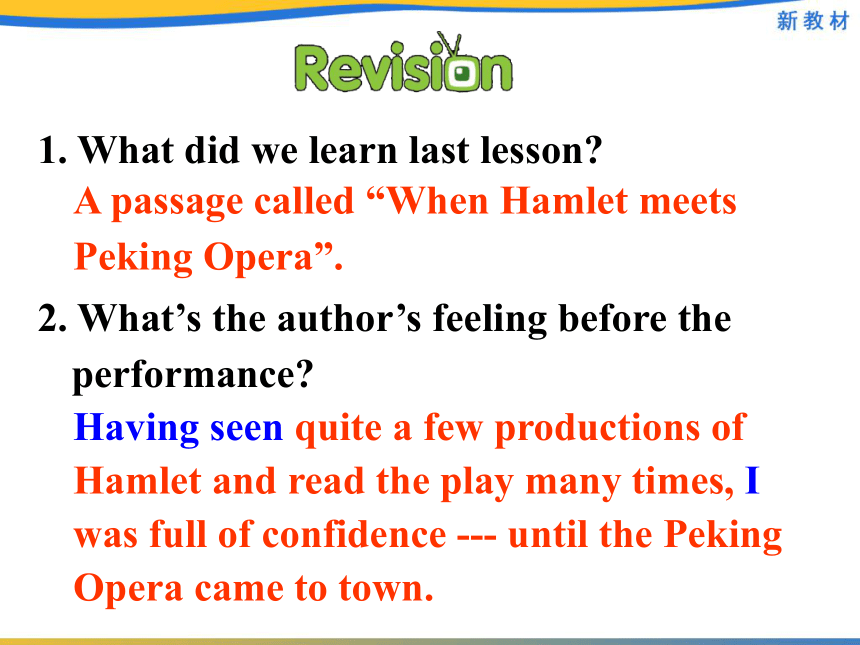
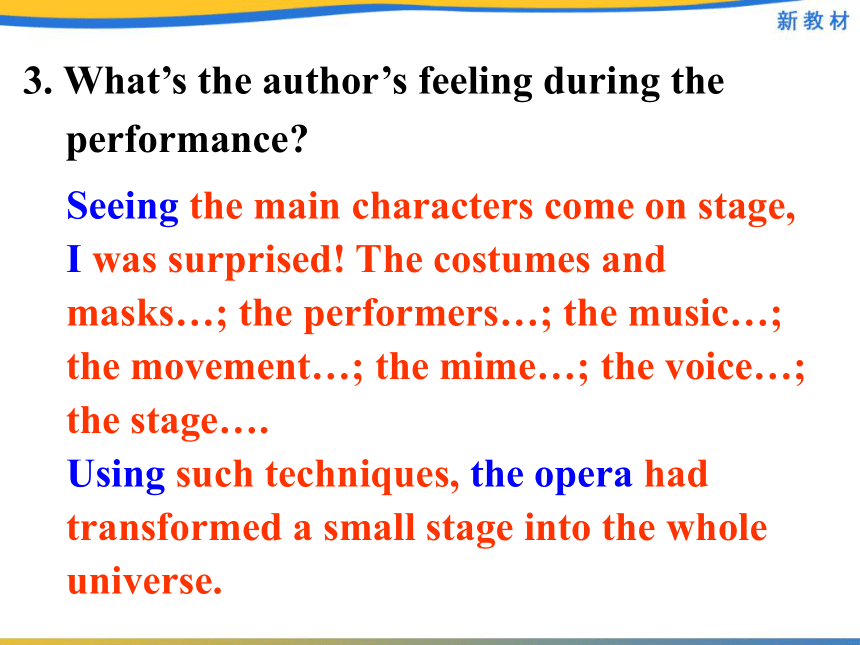
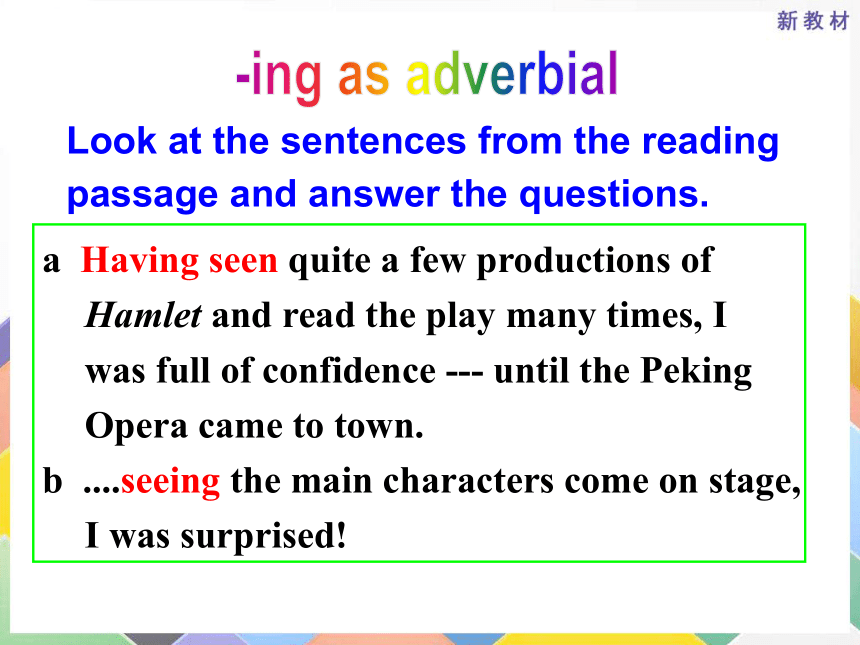
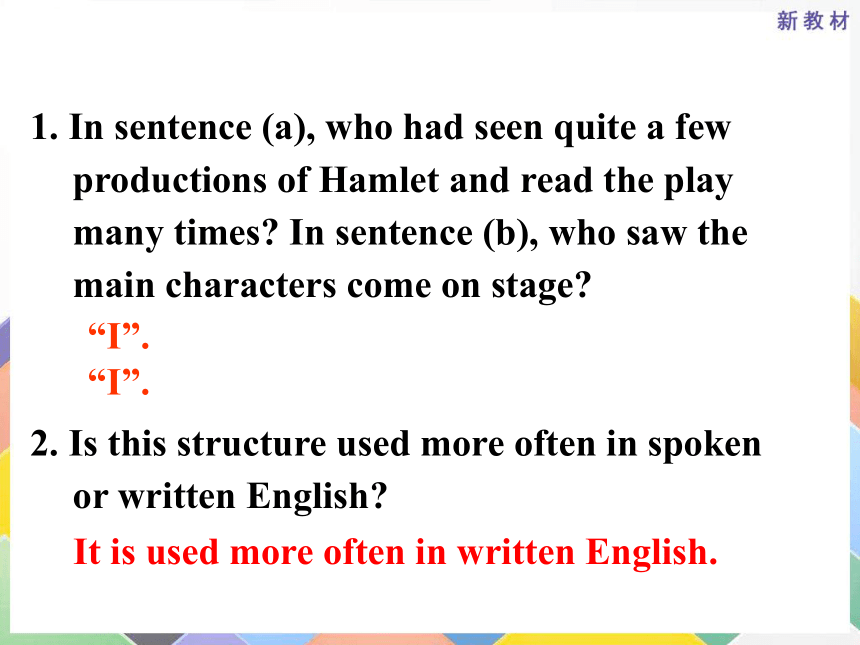
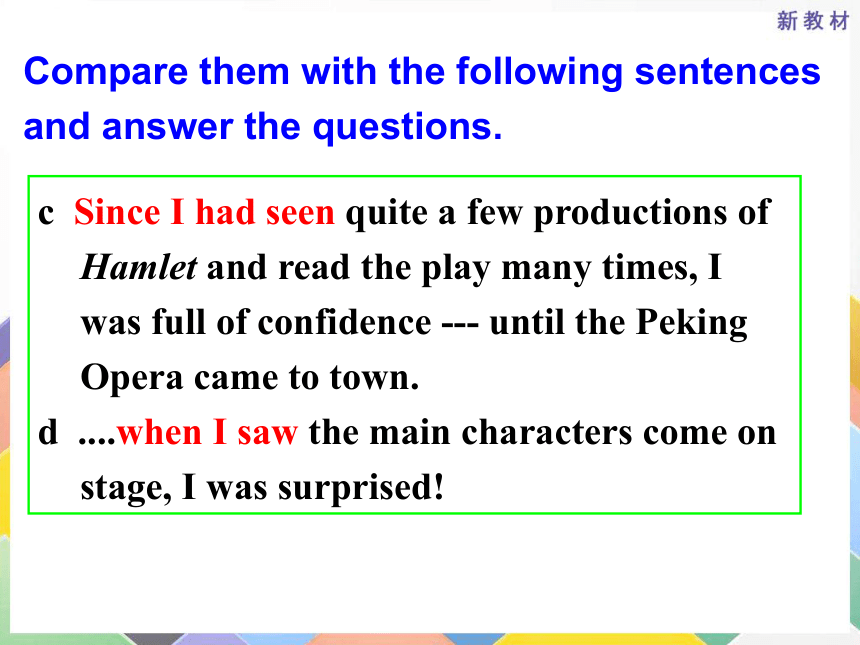
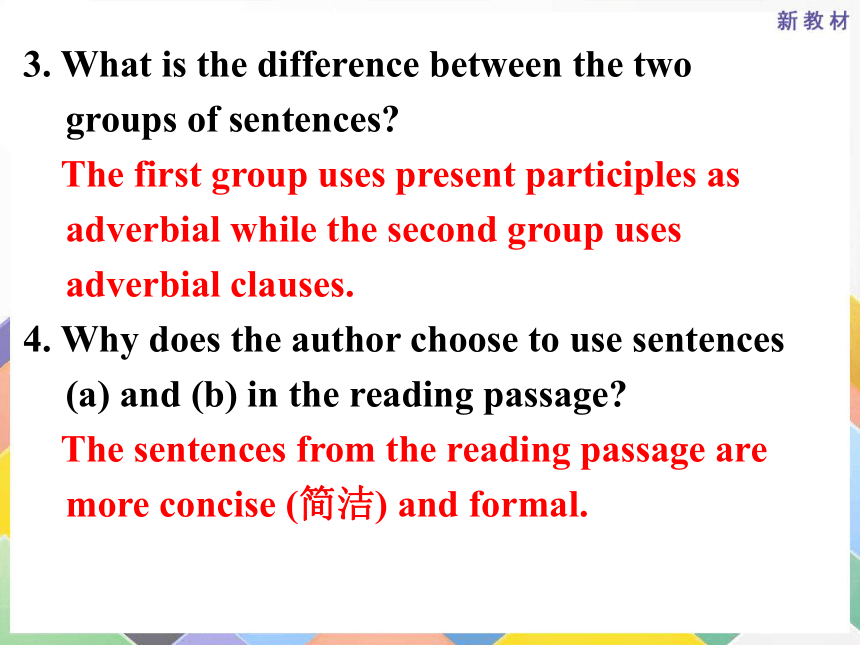
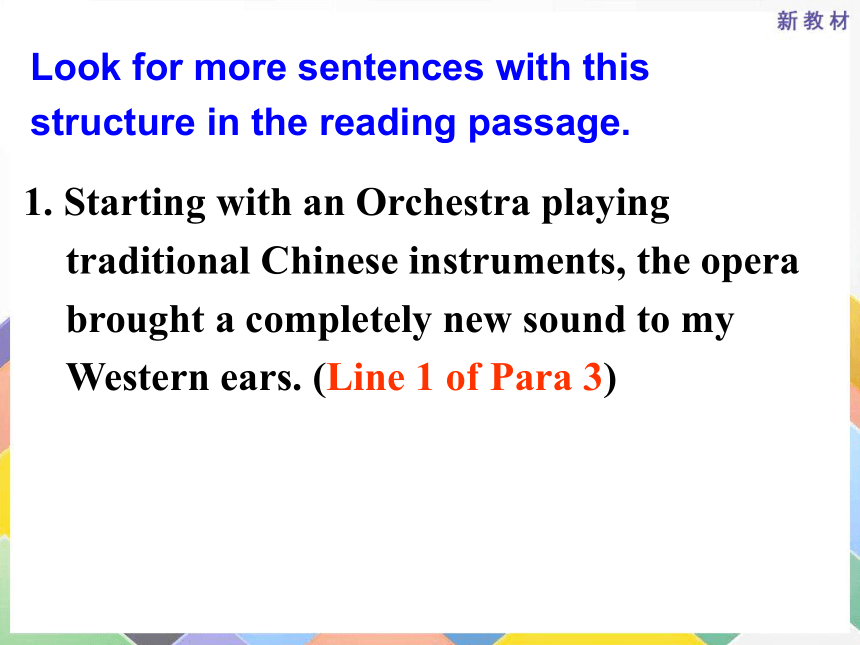
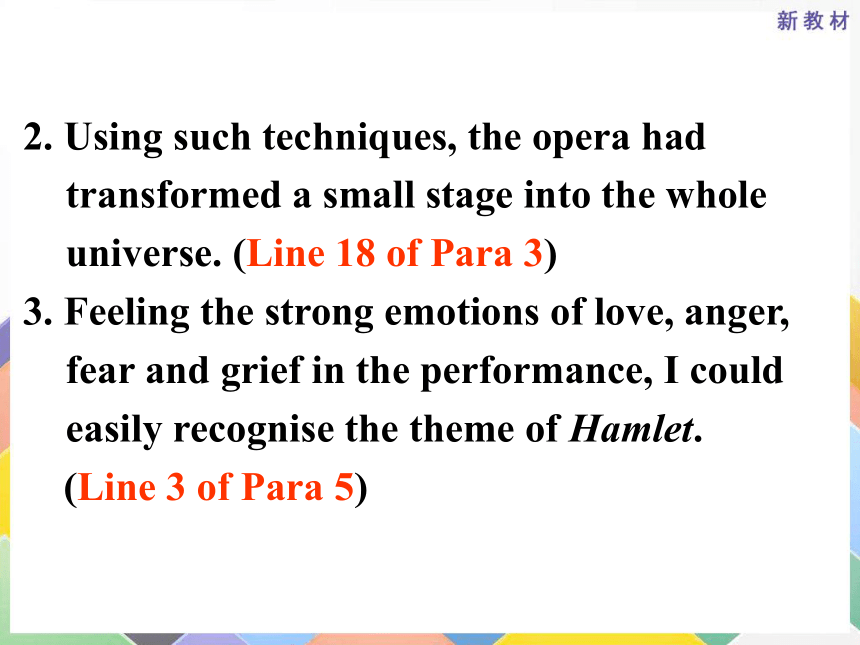
文档简介
(共64张PPT)
Unit 4
Unit 4
Stage and screen
To master the grammar: -ing as adverbial and use it in real context
To learn words and expressions about TV programmes and use them to talk about your favorite programmes
1. What did we learn last lesson
2. What’s the author’s feeling before the performance
A passage called “When Hamlet meets Peking Opera”.
Having seen quite a few productions of Hamlet and read the play many times, I was full of confidence --- until the Peking Opera came to town.
3. What’s the author’s feeling during the performance
Seeing the main characters come on stage, I was surprised! The costumes and masks…; the performers…; the music…; the movement…; the mime…; the voice…; the stage….
Using such techniques, the opera had transformed a small stage into the whole universe.
-ing as adverbial
Look at the sentences from the reading passage and answer the questions.
a Having seen quite a few productions of Hamlet and read the play many times, I was full of confidence --- until the Peking Opera came to town.
b ....seeing the main characters come on stage, I was surprised!
1. In sentence (a), who had seen quite a few productions of Hamlet and read the play many times In sentence (b), who saw the main characters come on stage
2. Is this structure used more often in spoken or written English
“I”.
“I”.
It is used more often in written English.
Compare them with the following sentences and answer the questions.
c Since I had seen quite a few productions of Hamlet and read the play many times, I was full of confidence --- until the Peking Opera came to town.
d ....when I saw the main characters come on stage, I was surprised!
3. What is the difference between the two groups of sentences
The first group uses present participles as adverbial while the second group uses adverbial clauses.
4. Why does the author choose to use sentences (a) and (b) in the reading passage
The sentences from the reading passage are more concise (简洁) and formal.
Look for more sentences with this structure in the reading passage.
1. Starting with an Orchestra playing traditional Chinese instruments, the opera brought a completely new sound to my Western ears. (Line 1 of Para 3)
2. Using such techniques, the opera had transformed a small stage into the whole universe. (Line 18 of Para 3)
3. Feeling the strong emotions of love, anger, fear and grief in the performance, I could easily recognise the theme of Hamlet.
(Line 3 of Para 5)
现在分词作状语
现在分词是非谓语动词的一种,兼有动词和形容词的特征,在句中可作表语,定语,宾语补足语和状语,一般表示进行或主动的意思。
现在分词用作状语时,其逻辑主语必须与句子的主语一致,现在分词所表示的动作和句子的主语是主动关系。
现在分词在句中可以作时间、原因、条件、让步、方式、伴随、程度和结果状语。
1. 作时间状语
Seeing the police, he made a run for the exit.
一看到警察,他就朝出口奔去。
分析:see的动作是由其逻辑主语“he”发出,与句子的主语he一致,且构成主动关系,所以用现在分词。
将下面的时间状语从句改写成简单句。
When he walked out of the room, he saw a dog.
Walking out of the room, he saw a dog.
2. 作原因状语
Being ill, he didn’t go to school yesterday.
因为生病了,他昨天没有上学。
分析: He is ill是He didn’t go to school的原因。be的逻辑主语和句子主语是一致, 主动关系。
Not knowing the way, he got lost.
翻译句子:由于不识路,他迷路了。
As he ____________________, he got lost.
didn’t know the way
否定现在分词在其前面加not。
3. 作条件状语
Turning to the left, you will see a school.
若是你左转,你就会看到一所学校。
If we ___________, we will get good results.
翻译句子:努力学习, 我们就会取得好成绩。
Studying hard, we will get good results.
study hard
4. 作让步状语
Granting this to be true, we cannot explain it.
虽然我们承认这是事实,却无法予以说明。
Knowing it is difficult, I don’t give up.
翻译句子:
虽然知道它很难,我也不放弃。
Although I _________________, I don’t give up.
know it is difficult
5. 作方式状语
You gave me such a fright creeping up on me like that! (你那样不声不响地从后面过来,吓我一跳!)
用现在分词作状语的结构翻译下列句子。
1) 请你用另一种方式回答问题。
2) 她跑进屋里来。
Please answer the question using another way.
She came running into the room.
6. 作结果状语
The child fell, striking his head against the door and cutting it. (那孩子跌倒了,头碰在门上磕破了。)
He went abroad, leaving his uncle a big house.
翻译句子:
他出国了,留给他叔叔一间大房子。
He went abroad and ________ his uncle a big house.
left
7. 作伴随状语
The little boy went upstairs, trailing his teddy bear behind him.
那个小男孩走上楼去,身后拖着他的玩具熊。
Emma was sitting in an armchair reading a book.
艾玛坐在一张扶手椅上看书。
He lay on the grass and ___________ the sky.
翻译下面句子。
他躺在草地上,凝望天空。
He lay on the grass, staring at the sky.
stared at
Notes: 现在分词作伴随状语、方式状语和结果状语时,通常可以转换成两个并列的简单句。
8. 作程度状语
现在分词作程度状语的用法有限,相当于程度副词,主要用于加强语气。
He was caught in the heavy rain and got his
clothes soaking wet.
他淋了一场大雨,把衣服全部弄湿了。
分析:soaking在这里相当于completely, really
等程度副词。
表示的特征 相当的状语从句
1. 时间
2. 原因
3. 条件
4. 让步
5. 方式/伴随/结果
时间状语从句
原因状语从句
条件状语从句
让步状语从句
并列结构
6. 程度
副词
现在分词作状语的学习中我们还应注意以下两点:
1. 为了使分词作状语表达的意思更明确,可在其 前面加上适当的连词:when, while, once, if, though, unless, even 等。
eg When waiting for the bus, he saw an old
friend.
Once losing the chance, you can’t easily find
it.
Don’t talk while having dinner.
1) Walking in the park, I met an old friend of mine.
2) We walked as fast as we could, hoping to get there on time.
结论:动词-ing形式所表示的动作和谓语动词同
时发生时,可用
_________________________。
2. 动词-ing形式动作和谓语动作的先后顺序
一般形式(doing)
3) Having waited for an hour, I became impatient.
4) Having been to the Great Wall many times,
he didn’t go last week.
结论:动词-ing形式所表示的动作在谓语动词之
前发生,有明显的先后顺序时,可用
______________________________。
完成形式(having done)
I. 用动词-ing形式改写下面句子。
1. Will put down his shopping bag and held out
his hand to the child.
__________________________________________________________________________________
2. When he crossed the road, he kept his eyes on the spot where the accident happened.
__________________________________________________________________________________
Having put down his shopping bag, Will held out his hand to the child.
He crossed the road, keeping his eyes on the spot where the accident happened.
3. The cat stepped forward and climbed through the hole in the wall.
__________________________________________________________________________________
4. When the bear came out of the forest, it
showed its teeth and made a loud noise.
__________________________________________________________________________________5. He turned away from me and looked out of
the window.
__________________________________________________________________________________
Having stepped forward, the cat climbed through the hole in the wall.
The bear came out of the forest, showing its teeth and making a loud noise.
He turned away from me, looking out of the window.
II. 单句改错
1. Having not seen the film, I can’t tell you what I
think of it.
2. Seen from the top of the hill, we find the city
more beautiful.
4. Generally speak, facial expressions are helpful
communications, too.
Not having
Seeing
speaking
独立成分作状语
补充:独立成分(做状语或插入语)
有些分词短语可作独立成分,用来解释整个句子,不受句子主语的限制。常见的分词短语有:
generally (frankly, honestly…)speaking, talking of(谈到), seeing that(考虑到), judging from(从…判断)。
Generally speaking, girls are more careful
than boys.
Judging from his accent, he must be from the
north.
Talking of cleaning, it’s about time you cleaned
the house.
2. Around 13,500 new jobs were created during the period, ___________ (exceed) the expected number of 12,000 held by market analysts. (2018江苏卷单项填空改编)
exceeding
1. Nervously ________ (face) challenges, I know I will whisper to myself the two simple words “Be yourself”. (2019 北京)
facing
3. The hospital has recently obtained new medical equipment, ________ (allow) more patients to be treated. (2017天津)
4. Many Chinese brands, _______________ (develop) their reputations over centuries, are facing new challenges from the modern market. (2017江苏)
allowing
having developed
Complete the journal entry with the correct form of the verbs in brackets.
Friday 15 May
Today I performed in the school play. I did a good job! __________ (see) all my family and friends in the audience applaud me, I _______ (feel) so confident and grateful.
At first, I hadn’t realised how much work it would be. The teacher was very strict, ________ (make) me so nervous that I would forget my lines. I often stayed up late at night ___________ (practise) my part.
Seeing
felt
to practice
making
_______ (feel) extremely discouraged, I almost gave up. But thanks to the support of my teacher, parents and friends, I overcame my fears, _______ (know) that I did the best I could.
It’s an unforgettable experience. No pain, no gain, as the saying goes.
Feeling
knowing
Rewrite the paragraph using the –ing form.
I went to watch the ballet The Peony Pavilion last night. Because I thought ballet was more or less the same everywhere, I was totally unprepared for its unique beauty. As soon as the curtain rose, I was absorbed. The performance borrowed a lot from Chinese dance and music, so the Eastern influence on the ballet was clear. The production was full of colours and romantic symbols, and challenged my senses in new ways. I enjoyed it so much that it’s changed my opinion about ballet. I can’t wait to go again!
almost, nearly
大约,多少有点
等不及干某事
I went to watch the ballet The Peony Pavilion last night. Having thought ballet was more or less the same everywhere, I was totally unprepared for its unique beauty. As soon as the curtain rose, I was absorbed. Borrowing a lot from Chinese dance and music, the Eastern influence on the ballet was clear. The production was full of colours and romantic symbols, challenging my senses in new ways. Enjoying it so much, I have changed my opinion about ballet. I can’t wait to go again!
1. As soon as the curtain rose, I was absorbed.
absorb v. 消减; 缓冲; 吸收; 合并;
吸引住(某人)的注意力或兴趣
【归纳】
absorb ... into 把……吸收进
absorb ... from 从……中吸收/取
be absorbed in (doing) sth. 专心(做)某事
absorb one’s attention 吸引某人注意力
【语境应用】完成句子。
1) ___________________, (全神贯注于绘画中)
John didn’t notice evening approaching.
2) Water and salts _______________ (被吸收
进) our blood stream.
3) We will be fully _________ (absorb) in the
attractive and fascinating performances.
(2019全国卷III)
Absorbed in painting
are absorbed into
absorbed
2. Having felt extremely discouraged, I almost
gave up.
extremely adv. “to a very great degree”极
度,极其
【归纳】
extremely cold climates 极寒气候
extremely important/ useful 极为重要/ 有
用
【拓展】
extreme adj. 极端的;极度的
n. 极端
go to extreme 走极端
in the extreme 极其,非常
extreme weather/ conditions 极端的天气/ 条
件
Types of TV programme
cartoon
Look at the pictures and answer the questions.
a
news programme
b
talent show
c
comedy
d
nature documentary
e
talk show
f
n. 纪录片
1. What do you know about these types of TV
programme
2. Can you think of some examples of each type
cartoon --- Journey to the West
news programme --- CCTV News
talent show --- The voice of China
comedy --- Fun Comedy (欢乐喜剧人)
nature documentary --- Animal World
talk show --- Readers
More types of TV programme
reality show: a television programme that does not use professional actors but shows real events and situations involving ordinary people
costume drama: a play, TV programme, or film that is about a particular time in history, in which people wear costumes from that time
soap opera: a television or radio story about the daily lives and the relationships of the same group of people, which is broadcast regularly
sitcom: a funny television programme in which the characters appear in different situations each week
Fresh off the boat
《初来乍到》
Read and match the descriptions to the types of TV programme. Underline the words and expressions describing them.
I absolutely loved last night’s episode of Best Singer! It was very exciting and totally unforgettable. Each of the contestants put on a wonderful performance — they all really wanted to win! The final winner was so talented.
c talent show
n. (电视连续剧或广播连载节目中的一集)
The Real Lives of Leopards — what an amazing programme! Leopards are such appealing creatures. Incredible photography of them in the wild. Highly recommended!
e nature documentary
I used to love A Good Laugh and I watched it every week. It was so popular, but now it’s got really boring. The jokes aren’t funny at all. What a waste of time!
d comedy
Monkey King: Hero is Back is my favourite! The Mondy King is really cool, and definitely a hero to me! I also enjoy the creative plot and settings. The writers and artists have such great imaginations. I’m thrilled to see Chinese culture presented in such an amazing and magical way.
a cartoon
adv. 确切地,肯定地
n. (书、电影、戏剧的)情节
I like to know what’s going on in the world first thing in the morning, so I never miss this programme! It has all the headlines and market information you could possibly need. And there’s a handy traffic report, too!
b news programme
I watched Talk King last night, but I didn’t like it. What a rude person the host was! He hardly let his guests say a word! It’s a wonder they didn’t walk out of the studio.
f talk show
adj. 粗鲁的,无礼的
Expressions on describing TV programmes
It was very exciting and totally unforgettable.
What an amazing programme!
It was so popular.
It has all the headlines and market information you could possibly need. And there’s a handy report, too.
What a rude person the host was!
Work in pairs. Talk about your favourite TV programme using the words and expressions you have learnt.
A: What’s your favourite TV programme
B: My favourite TV programme is …It’s a …
A: Why do you like it
1. Each of the contestants put on a wonderful
performance— they all really wanted to
win!
put on 表演(节目);播放;穿上,带
上;长胖,增加体重
【拓展】put相关短语
put down 放下;记下;镇压
put off 延期,推迟
put away 将……收起
put up with 忍受,容忍
put forward 提出;将……提前
put out 扑灭;熄灭
put up 举起;建造;张贴;提高
【语境应用】翻译句子。
1) The local drame club is putting on Macbeth
(《麦克白》).
2) Hurry up! Put your coat on!
3) Do you mind if I put some music on
4) She looks like she’s put on weight.
5) He must have put on several kilos.
当地的剧社正在演出《麦克白》。
快点!把外衣穿上!
我放点音乐你不介意吧?
她似乎发胖了。
他体重一定增加了好几公斤。
2. Leopards are such appealing creatures.
appealing adj. “attractive or interesting”
有吸引力的,有趣的
be appealing to sb. 对某人有吸引力
eg The idea of not having to get up early
every morning is rather appealing to me.
每天不用早起,这对我很有吸引力。
【拓展】
appeal v. & n. 有吸引力;呼吁;恳求
appeal to sb. 对某人有吸引力
appeal for sth. 呼吁某事; 请求给予
appeal to sb. for sth.
请求某人某事/为某事向某人提出呼吁
appeal to sb. to do sth.
呼吁/恳求某人做某事
make an appeal to sb. 向某人呼吁
【语境应用】单句语法填空。
1) The government appealed to the
International Red Cross ________ (help)
the people suffering from the floods.
2) What’s more,it is another effective way
to appeal _____ the news media.
一句多译
3) 作者向我们呼吁要对动物更加友好。
① The author _________________________
be more kind to animals. (appeal v.)
② The author _________________________
be more kind to animals. (appeal n. )
to help
to
appeals to us to
makes an appeal to us to
Write a short passage about your favourite TV programme. Try to use some –ing as adverbial sentences. You can use the words and expressions in Activity 5 as reference.
Unit 4
Unit 4
Stage and screen
To master the grammar: -ing as adverbial and use it in real context
To learn words and expressions about TV programmes and use them to talk about your favorite programmes
1. What did we learn last lesson
2. What’s the author’s feeling before the performance
A passage called “When Hamlet meets Peking Opera”.
Having seen quite a few productions of Hamlet and read the play many times, I was full of confidence --- until the Peking Opera came to town.
3. What’s the author’s feeling during the performance
Seeing the main characters come on stage, I was surprised! The costumes and masks…; the performers…; the music…; the movement…; the mime…; the voice…; the stage….
Using such techniques, the opera had transformed a small stage into the whole universe.
-ing as adverbial
Look at the sentences from the reading passage and answer the questions.
a Having seen quite a few productions of Hamlet and read the play many times, I was full of confidence --- until the Peking Opera came to town.
b ....seeing the main characters come on stage, I was surprised!
1. In sentence (a), who had seen quite a few productions of Hamlet and read the play many times In sentence (b), who saw the main characters come on stage
2. Is this structure used more often in spoken or written English
“I”.
“I”.
It is used more often in written English.
Compare them with the following sentences and answer the questions.
c Since I had seen quite a few productions of Hamlet and read the play many times, I was full of confidence --- until the Peking Opera came to town.
d ....when I saw the main characters come on stage, I was surprised!
3. What is the difference between the two groups of sentences
The first group uses present participles as adverbial while the second group uses adverbial clauses.
4. Why does the author choose to use sentences (a) and (b) in the reading passage
The sentences from the reading passage are more concise (简洁) and formal.
Look for more sentences with this structure in the reading passage.
1. Starting with an Orchestra playing traditional Chinese instruments, the opera brought a completely new sound to my Western ears. (Line 1 of Para 3)
2. Using such techniques, the opera had transformed a small stage into the whole universe. (Line 18 of Para 3)
3. Feeling the strong emotions of love, anger, fear and grief in the performance, I could easily recognise the theme of Hamlet.
(Line 3 of Para 5)
现在分词作状语
现在分词是非谓语动词的一种,兼有动词和形容词的特征,在句中可作表语,定语,宾语补足语和状语,一般表示进行或主动的意思。
现在分词用作状语时,其逻辑主语必须与句子的主语一致,现在分词所表示的动作和句子的主语是主动关系。
现在分词在句中可以作时间、原因、条件、让步、方式、伴随、程度和结果状语。
1. 作时间状语
Seeing the police, he made a run for the exit.
一看到警察,他就朝出口奔去。
分析:see的动作是由其逻辑主语“he”发出,与句子的主语he一致,且构成主动关系,所以用现在分词。
将下面的时间状语从句改写成简单句。
When he walked out of the room, he saw a dog.
Walking out of the room, he saw a dog.
2. 作原因状语
Being ill, he didn’t go to school yesterday.
因为生病了,他昨天没有上学。
分析: He is ill是He didn’t go to school的原因。be的逻辑主语和句子主语是一致, 主动关系。
Not knowing the way, he got lost.
翻译句子:由于不识路,他迷路了。
As he ____________________, he got lost.
didn’t know the way
否定现在分词在其前面加not。
3. 作条件状语
Turning to the left, you will see a school.
若是你左转,你就会看到一所学校。
If we ___________, we will get good results.
翻译句子:努力学习, 我们就会取得好成绩。
Studying hard, we will get good results.
study hard
4. 作让步状语
Granting this to be true, we cannot explain it.
虽然我们承认这是事实,却无法予以说明。
Knowing it is difficult, I don’t give up.
翻译句子:
虽然知道它很难,我也不放弃。
Although I _________________, I don’t give up.
know it is difficult
5. 作方式状语
You gave me such a fright creeping up on me like that! (你那样不声不响地从后面过来,吓我一跳!)
用现在分词作状语的结构翻译下列句子。
1) 请你用另一种方式回答问题。
2) 她跑进屋里来。
Please answer the question using another way.
She came running into the room.
6. 作结果状语
The child fell, striking his head against the door and cutting it. (那孩子跌倒了,头碰在门上磕破了。)
He went abroad, leaving his uncle a big house.
翻译句子:
他出国了,留给他叔叔一间大房子。
He went abroad and ________ his uncle a big house.
left
7. 作伴随状语
The little boy went upstairs, trailing his teddy bear behind him.
那个小男孩走上楼去,身后拖着他的玩具熊。
Emma was sitting in an armchair reading a book.
艾玛坐在一张扶手椅上看书。
He lay on the grass and ___________ the sky.
翻译下面句子。
他躺在草地上,凝望天空。
He lay on the grass, staring at the sky.
stared at
Notes: 现在分词作伴随状语、方式状语和结果状语时,通常可以转换成两个并列的简单句。
8. 作程度状语
现在分词作程度状语的用法有限,相当于程度副词,主要用于加强语气。
He was caught in the heavy rain and got his
clothes soaking wet.
他淋了一场大雨,把衣服全部弄湿了。
分析:soaking在这里相当于completely, really
等程度副词。
表示的特征 相当的状语从句
1. 时间
2. 原因
3. 条件
4. 让步
5. 方式/伴随/结果
时间状语从句
原因状语从句
条件状语从句
让步状语从句
并列结构
6. 程度
副词
现在分词作状语的学习中我们还应注意以下两点:
1. 为了使分词作状语表达的意思更明确,可在其 前面加上适当的连词:when, while, once, if, though, unless, even 等。
eg When waiting for the bus, he saw an old
friend.
Once losing the chance, you can’t easily find
it.
Don’t talk while having dinner.
1) Walking in the park, I met an old friend of mine.
2) We walked as fast as we could, hoping to get there on time.
结论:动词-ing形式所表示的动作和谓语动词同
时发生时,可用
_________________________。
2. 动词-ing形式动作和谓语动作的先后顺序
一般形式(doing)
3) Having waited for an hour, I became impatient.
4) Having been to the Great Wall many times,
he didn’t go last week.
结论:动词-ing形式所表示的动作在谓语动词之
前发生,有明显的先后顺序时,可用
______________________________。
完成形式(having done)
I. 用动词-ing形式改写下面句子。
1. Will put down his shopping bag and held out
his hand to the child.
__________________________________________________________________________________
2. When he crossed the road, he kept his eyes on the spot where the accident happened.
__________________________________________________________________________________
Having put down his shopping bag, Will held out his hand to the child.
He crossed the road, keeping his eyes on the spot where the accident happened.
3. The cat stepped forward and climbed through the hole in the wall.
__________________________________________________________________________________
4. When the bear came out of the forest, it
showed its teeth and made a loud noise.
__________________________________________________________________________________5. He turned away from me and looked out of
the window.
__________________________________________________________________________________
Having stepped forward, the cat climbed through the hole in the wall.
The bear came out of the forest, showing its teeth and making a loud noise.
He turned away from me, looking out of the window.
II. 单句改错
1. Having not seen the film, I can’t tell you what I
think of it.
2. Seen from the top of the hill, we find the city
more beautiful.
4. Generally speak, facial expressions are helpful
communications, too.
Not having
Seeing
speaking
独立成分作状语
补充:独立成分(做状语或插入语)
有些分词短语可作独立成分,用来解释整个句子,不受句子主语的限制。常见的分词短语有:
generally (frankly, honestly…)speaking, talking of(谈到), seeing that(考虑到), judging from(从…判断)。
Generally speaking, girls are more careful
than boys.
Judging from his accent, he must be from the
north.
Talking of cleaning, it’s about time you cleaned
the house.
2. Around 13,500 new jobs were created during the period, ___________ (exceed) the expected number of 12,000 held by market analysts. (2018江苏卷单项填空改编)
exceeding
1. Nervously ________ (face) challenges, I know I will whisper to myself the two simple words “Be yourself”. (2019 北京)
facing
3. The hospital has recently obtained new medical equipment, ________ (allow) more patients to be treated. (2017天津)
4. Many Chinese brands, _______________ (develop) their reputations over centuries, are facing new challenges from the modern market. (2017江苏)
allowing
having developed
Complete the journal entry with the correct form of the verbs in brackets.
Friday 15 May
Today I performed in the school play. I did a good job! __________ (see) all my family and friends in the audience applaud me, I _______ (feel) so confident and grateful.
At first, I hadn’t realised how much work it would be. The teacher was very strict, ________ (make) me so nervous that I would forget my lines. I often stayed up late at night ___________ (practise) my part.
Seeing
felt
to practice
making
_______ (feel) extremely discouraged, I almost gave up. But thanks to the support of my teacher, parents and friends, I overcame my fears, _______ (know) that I did the best I could.
It’s an unforgettable experience. No pain, no gain, as the saying goes.
Feeling
knowing
Rewrite the paragraph using the –ing form.
I went to watch the ballet The Peony Pavilion last night. Because I thought ballet was more or less the same everywhere, I was totally unprepared for its unique beauty. As soon as the curtain rose, I was absorbed. The performance borrowed a lot from Chinese dance and music, so the Eastern influence on the ballet was clear. The production was full of colours and romantic symbols, and challenged my senses in new ways. I enjoyed it so much that it’s changed my opinion about ballet. I can’t wait to go again!
almost, nearly
大约,多少有点
等不及干某事
I went to watch the ballet The Peony Pavilion last night. Having thought ballet was more or less the same everywhere, I was totally unprepared for its unique beauty. As soon as the curtain rose, I was absorbed. Borrowing a lot from Chinese dance and music, the Eastern influence on the ballet was clear. The production was full of colours and romantic symbols, challenging my senses in new ways. Enjoying it so much, I have changed my opinion about ballet. I can’t wait to go again!
1. As soon as the curtain rose, I was absorbed.
absorb v. 消减; 缓冲; 吸收; 合并;
吸引住(某人)的注意力或兴趣
【归纳】
absorb ... into 把……吸收进
absorb ... from 从……中吸收/取
be absorbed in (doing) sth. 专心(做)某事
absorb one’s attention 吸引某人注意力
【语境应用】完成句子。
1) ___________________, (全神贯注于绘画中)
John didn’t notice evening approaching.
2) Water and salts _______________ (被吸收
进) our blood stream.
3) We will be fully _________ (absorb) in the
attractive and fascinating performances.
(2019全国卷III)
Absorbed in painting
are absorbed into
absorbed
2. Having felt extremely discouraged, I almost
gave up.
extremely adv. “to a very great degree”极
度,极其
【归纳】
extremely cold climates 极寒气候
extremely important/ useful 极为重要/ 有
用
【拓展】
extreme adj. 极端的;极度的
n. 极端
go to extreme 走极端
in the extreme 极其,非常
extreme weather/ conditions 极端的天气/ 条
件
Types of TV programme
cartoon
Look at the pictures and answer the questions.
a
news programme
b
talent show
c
comedy
d
nature documentary
e
talk show
f
n. 纪录片
1. What do you know about these types of TV
programme
2. Can you think of some examples of each type
cartoon --- Journey to the West
news programme --- CCTV News
talent show --- The voice of China
comedy --- Fun Comedy (欢乐喜剧人)
nature documentary --- Animal World
talk show --- Readers
More types of TV programme
reality show: a television programme that does not use professional actors but shows real events and situations involving ordinary people
costume drama: a play, TV programme, or film that is about a particular time in history, in which people wear costumes from that time
soap opera: a television or radio story about the daily lives and the relationships of the same group of people, which is broadcast regularly
sitcom: a funny television programme in which the characters appear in different situations each week
Fresh off the boat
《初来乍到》
Read and match the descriptions to the types of TV programme. Underline the words and expressions describing them.
I absolutely loved last night’s episode of Best Singer! It was very exciting and totally unforgettable. Each of the contestants put on a wonderful performance — they all really wanted to win! The final winner was so talented.
c talent show
n. (电视连续剧或广播连载节目中的一集)
The Real Lives of Leopards — what an amazing programme! Leopards are such appealing creatures. Incredible photography of them in the wild. Highly recommended!
e nature documentary
I used to love A Good Laugh and I watched it every week. It was so popular, but now it’s got really boring. The jokes aren’t funny at all. What a waste of time!
d comedy
Monkey King: Hero is Back is my favourite! The Mondy King is really cool, and definitely a hero to me! I also enjoy the creative plot and settings. The writers and artists have such great imaginations. I’m thrilled to see Chinese culture presented in such an amazing and magical way.
a cartoon
adv. 确切地,肯定地
n. (书、电影、戏剧的)情节
I like to know what’s going on in the world first thing in the morning, so I never miss this programme! It has all the headlines and market information you could possibly need. And there’s a handy traffic report, too!
b news programme
I watched Talk King last night, but I didn’t like it. What a rude person the host was! He hardly let his guests say a word! It’s a wonder they didn’t walk out of the studio.
f talk show
adj. 粗鲁的,无礼的
Expressions on describing TV programmes
It was very exciting and totally unforgettable.
What an amazing programme!
It was so popular.
It has all the headlines and market information you could possibly need. And there’s a handy report, too.
What a rude person the host was!
Work in pairs. Talk about your favourite TV programme using the words and expressions you have learnt.
A: What’s your favourite TV programme
B: My favourite TV programme is …It’s a …
A: Why do you like it
1. Each of the contestants put on a wonderful
performance— they all really wanted to
win!
put on 表演(节目);播放;穿上,带
上;长胖,增加体重
【拓展】put相关短语
put down 放下;记下;镇压
put off 延期,推迟
put away 将……收起
put up with 忍受,容忍
put forward 提出;将……提前
put out 扑灭;熄灭
put up 举起;建造;张贴;提高
【语境应用】翻译句子。
1) The local drame club is putting on Macbeth
(《麦克白》).
2) Hurry up! Put your coat on!
3) Do you mind if I put some music on
4) She looks like she’s put on weight.
5) He must have put on several kilos.
当地的剧社正在演出《麦克白》。
快点!把外衣穿上!
我放点音乐你不介意吧?
她似乎发胖了。
他体重一定增加了好几公斤。
2. Leopards are such appealing creatures.
appealing adj. “attractive or interesting”
有吸引力的,有趣的
be appealing to sb. 对某人有吸引力
eg The idea of not having to get up early
every morning is rather appealing to me.
每天不用早起,这对我很有吸引力。
【拓展】
appeal v. & n. 有吸引力;呼吁;恳求
appeal to sb. 对某人有吸引力
appeal for sth. 呼吁某事; 请求给予
appeal to sb. for sth.
请求某人某事/为某事向某人提出呼吁
appeal to sb. to do sth.
呼吁/恳求某人做某事
make an appeal to sb. 向某人呼吁
【语境应用】单句语法填空。
1) The government appealed to the
International Red Cross ________ (help)
the people suffering from the floods.
2) What’s more,it is another effective way
to appeal _____ the news media.
一句多译
3) 作者向我们呼吁要对动物更加友好。
① The author _________________________
be more kind to animals. (appeal v.)
② The author _________________________
be more kind to animals. (appeal n. )
to help
to
appeals to us to
makes an appeal to us to
Write a short passage about your favourite TV programme. Try to use some –ing as adverbial sentences. You can use the words and expressions in Activity 5 as reference.
